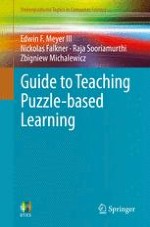2014 | OriginalPaper | Buchkapitel
5. Understand the Problem
verfasst von : Edwin F. Meyer III, Nickolas Falkner, Raja Sooriamurthi, Zbigniew Michalewicz
Erschienen in: Guide to Teaching Puzzle-based Learning
Verlag: Springer London
Aktivieren Sie unsere intelligente Suche, um passende Fachinhalte oder Patente zu finden.
Wählen Sie Textabschnitte aus um mit Künstlicher Intelligenz passenden Patente zu finden. powered by
Markieren Sie Textabschnitte, um KI-gestützt weitere passende Inhalte zu finden. powered by
